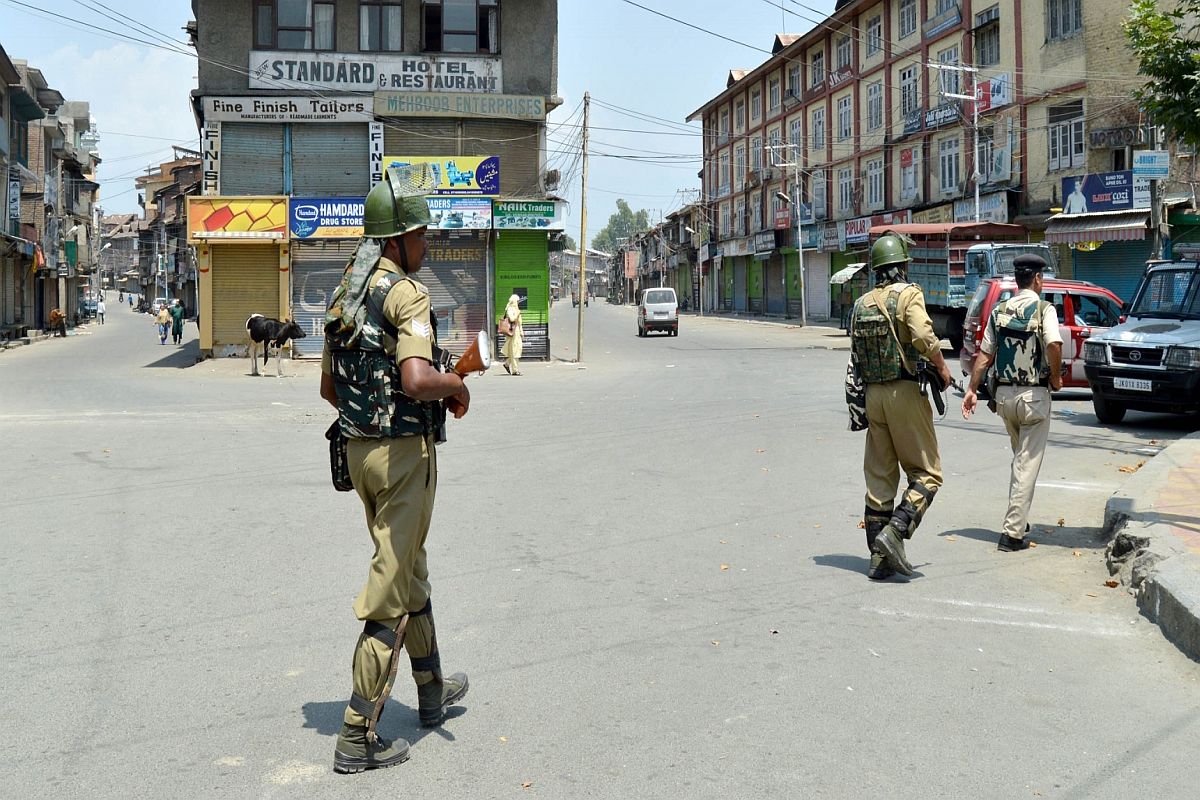A two-day curfew was been imposed in the Kashmir valley on Tuesday ahead of the first anniversary of abrogation of Article 370 which granted special status to the erstwhile state of Jammu and Kashmir.
The decision was taken at the security core group meeting held on Monday in Srinagar. The meeting was chaired by Lt general B.S. Raju, GOC of army’s Srinagar headquartered 15 corps.
Advertisement
The decision was reportedly taken following specific inputs that separatists and Pakistan sponsored groups were planning to observe August 5 as Black Day and hold violent protests which could endanger public order.
“…Protests are not ruled out. There are specific inputs about violent protests endangering public life and property,” the order for Srinagar district said, though the curfew is applicable across Kashmir valley.
Medical emergencies and government staff holding valid identity cards and passes have been exempted from these restrictions imposed under section 144 CrPC.
“…Movement and assembly of people have been prohibited to avoid spread (of COVID-19) particularly in wake of recent spike. Thus, any mass gathering would be detrimental to efforts related to COVID-19 containment as well,” the district magistrate said.
In an unprecedented move, the Central government on August 5 last year scrapped Article 370 of the Indian Constitution which gave autonomous status to the erstwhile state of Jammu and Kashmir and bifurcated it into two Union Territories – Jammu and Kashmir and Ladakh.
Union Home Minister Amit Shah had proposed in the Rajya Sabha to revoke Article 370 of the Constitution in Jammu and Kashmir amid uproar by opposition members.
Ahead of the announcement, Jammu and Kashmir was put under virtual curfew on 5 and almost 400 political leaders of the Valley including three former chief ministers – Farooq Abdullah, Omar Abdullah and Mehbooba Mufti were placed under detention.
A massive security build-up was witnessed in the valley with over 8000 additional paramilitary troops being airlifted to the state.
Mobile internet services were suspended across the state to “prevent anti-social elements from spreading rumours”.
All schools and colleges in the valley were shut owing to the political crisis and all Kashmir University exams were postponed without specifying the next date.
On October 31, pursuant to the Jammu and Kashmir Reorganisation Bill, 2019, which the government passed in Parliament on August 5, Jammu and Kashmir ceased to exist as a state and was officially bifurcated into two Union Territories – Jammu and Kashmir and Ladakh.
Repealing Article 370 and Article 35A had long been one of the core BJP promises and the demand for its abrogation had risen after the Pulwama terror attack.
Article 370 granted special status to Jammu and Kashmir and limits Parliament’s power to make laws concerning the state. It was incorporated in India’s Constitution in October 1949. It also gives power to the state legislature to define Jammu and Kashmir’s residents and their privileges.
Article 35A was proclaimed by President Rajendra Prasad on 14 May 1954 on the advice of the Jawaharlal Nehru government to empower the Jammu and Kashmir legislature to define the permanent residents of the state and their entitlements. It was drawn from the Delhi Agreement of 1952 and from Article 370 that confers special status to the state.
Meanwhle, former Jammu and Kashmir chief minister and National Conference leader Omar Abdullah, who was released on March 24, tweeted that the “preparations (for restrictions) start a full 24 hours earlier this year compared to 2019.”
“The preparations start a full 24 hours earlier this year compared to 2019 with Srinagar, and I presume the same is being done across the valley, being placed under strict curfew from tonight for the next two days,” he tweeted.
His father, and National conference chief Farooq Abdullah was released from detention on March 13.
However, Mehbooba Mufti continues to be in detention. The Jammu and Kashmir government has again extended Mufti’s detention under Public Safety Act (PSA) by another three months.
An order issued by Principal Secretary, Home, Shaleen Kabra, said that in order to prevent her from acting in any manner prejudicial to maintenance of public order, the government directs that the period of detention of Mehbooba Mufti under the PSA be extended for a further period of three months.











